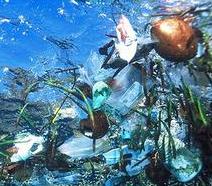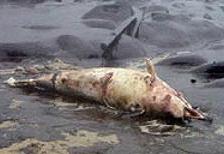 聯合國秘書長潘基文於6月8日慶祝第一個世界海洋日時警告說,世界海洋正面臨人類活動帶來空前的「可怕後果」。
聯合國秘書長潘基文於6月8日慶祝第一個世界海洋日時警告說,世界海洋正面臨人類活動帶來空前的「可怕後果」。
地球97.5%的水源來自海洋,同時70%的地表為其所覆蓋。海洋是生物吸入的氧氣、各種食品和藥品的重要來源、主宰氣候調節的功臣。
但像海潮般增加的海洋垃圾不斷危及全球的海洋和海邊生態環境。聯合國環境規劃署(UNEP)和海洋保育協會(Ocean Conservancy)8日公佈的一份報告指出。
第一次嘗試在12個全球主要海域清點海洋垃圾的情況發現,香煙和塑料,尤其是塑膠袋、瓶佔海洋垃圾類型的大部分。
塑料很容易被海洋哺乳動物、鳥類、魚類、海龜誤認為食物。特別是海龜,錯把漂浮的塑膠袋當成最喜好的食品「海蜇。」
 此項爲期五年針對北海地區海燕所做的調查,在95%的海鳥肚裏發現了塑料。菸蒂,煙草盒和雪茄濾嘴佔所有地中海海洋垃圾的40%。而類似的垃圾佔2005年厄瓜多爾沿海垃圾總量的一半以上。
此項爲期五年針對北海地區海燕所做的調查,在95%的海鳥肚裏發現了塑料。菸蒂,煙草盒和雪茄濾嘴佔所有地中海海洋垃圾的40%。而類似的垃圾佔2005年厄瓜多爾沿海垃圾總量的一半以上。
自然保育協會的全球海洋計劃主任海爾(Lynne Hale)說:「聯合國設立世界海洋日,目的為提升人們對海洋的認識、海洋對人類的重要性、以及海洋所面臨日益嚴重的威脅。」
自然保育協會建議:
- 減少塑料使用,以可重複使用的塑料購物袋,水瓶和器皿來取代。
- 謹慎選擇食用的海鮮。隨身攜帶蒙特利灣水族館的海產品指南或是傳簡訊到藍色海洋的FishPhone下載訊息,儘量以可持續海鮮類別作爲選擇對象。
- 妥善處置化學品。切忌將化學、藥品、石油、油漆倒入排水溝或廁所。建議與您轄區的「一般用戶危險廢棄物管理處」聯係,妥善處置或回收利用化學品,避免流入河川和海洋。
- 選擇綠色洗滌劑和家用清潔劑。
- 恢復日漸消退的海岸線。入住海岸旅店前,詢問工作人員如何處理污水和游泳池廢水,以及其餐廳的魚貨是否取自可持續來源。
- 找出食物來源。購買產地食品,有機食品可降低碳足跡、支持地方經濟、減少流入河川和海洋的農藥跟化肥。
- 種植本地物種。減少草坪的栽種,本地花木不僅可提供鳥類和其他野生動物更好的棲息地,減少灌溉用水,同時避免肥料流入河川和海洋。
- 保持海灘清潔。呵護脆弱的沙丘,帶走您的垃圾,把植物、鳥類和野生動物留給其他的人共同享用。
- 購買珠寶首飾、家庭裝飾、魚缸配件時,選擇珊瑚替代品。(更正註)
- 替我們的海洋歡呼。
Human activities are taking a "terrible toll" on the world's oceans and seas, UN Secretary-General Ban Ki-moon warned today in a message marking the first United Nations World Oceans Day.
Oceans provide 97.5 percent of the Earth's water and cover 70 percent of the planet's surface. Oceans generate most of the oxygen humans and animals breathe, regulates the climate and offers an array of foods and medicines. But a rising tide of marine litter is harming oceans and beaches worldwide, says a new report released today by the UN Environment Programme and Ocean Conservancy.
The first attempt to take stock of the marine litter situation in the 12 major regional seas around the world finds that cigarettes and plastic ?especially plastic bags and PET bottles ?is the most pervasive type of marine litter around the world.
Plastics can be mistaken as food by marine mammals, birds, fish and turtles. Sea turtles, in particular, may confuse floating plastic bags with jellyfish, one of their favorite foods.
A five-year survey of fulmars found in the North Sea region found that 95 percent of these seabirds had plastic in their stomachs. Cigarette filters, tobacco packets and cigar tips make up 40 percent of all marine litter in the Mediterranean, while in Ecuador smoking-related rubbish accounted for over half of the total coastal litter in 2005.
"World Ocean Day was established by the United Nations to help create awareness about our seas, their importance to people, and the growing threats they face," said Lynne Hale, director of The Nature Conservancy's global marine program.
The Nature Conservancy suggests:
- Reduce plastic consumption with reusable shopping bags, water bottles and utensils.
- Make informed seafood choices. Keep a copy of the Monterey Bay Aquarium's seafood guide in your wallet or text Blue Ocean's FishPhone to help you choose sustainable seafood at the grocery store or a restaurant.
- Dispose of chemicals properly. Never pour chemicals, pharmaceuticals, oil or paint into the drain or toilets. Check with your county's household hazardous waste program to properly dispose of or recycle chemicals and keep them out of rivers and oceans.
- Choose green detergents and household cleaners.
- Get the dirt on your beachside retreat. Before you stay in a hotel on the coast, ask staff what happens to their sewage and swimming pool water, and if they source their restaurant fish from sustainable sources.
- Find out the source of your food. Buying local, organic food reduces your carbon footprint, supports the local economy and reduces the amount of pesticides and fertilizers can run off into rivers and oceans.
- Fill your yard with native species. Reducing the amount of grass in your lawn by planting native shrubs and flower beds will provide a better habitat for birds and other wildlife and require less water and fertilizer, which can run off into into rivers and oceans.
- Keep your beach visit clean. Stay off fragile sand dunes, take your trash with you and leave plants, birds and wildlife for everyone to enjoy.
- Choose alternatives to coral when shopping for jewelry, household decor or accessories for fish tanks.
- Celebrate our oceans.


